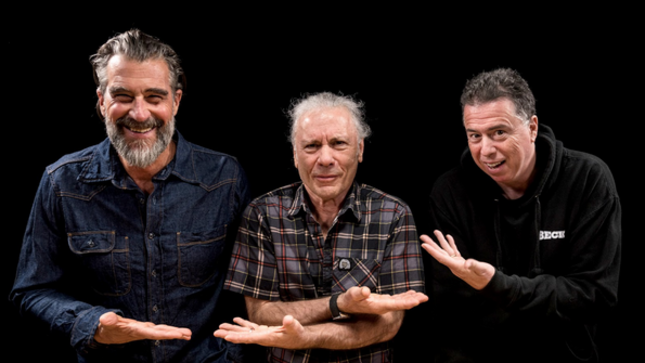
They don’t make ’em like Bruce Dickinson anymore. As far as hard rock gods go, the Iron Maiden singer stands apart as a study in authentic multiplicity, especially in a sea of personal brands, social media influencers, and celebrities who carefully curate a public persona. While millions know his thundering vocals powering Iron Maiden's "The Trooper" and "Run to the Hills," few realize that the same voice that commands metal's greatest stages also guides passenger jets through radio communications with air traffic control. And that’s all before he picks up his fencing foil, wielding it with expertise and grace.
Dickinson recently joined Rich Roll on “The Rich Roll Podcast” along with guest and fan filmmaker Sacha Gervasi for an eye-opening discussion spanning the music legend’s lengthy career and surprising hobbies.
The Renaissance Rocker
When discussing Dickinson, most immediately recognize him as Iron Maiden's distinguished front man for four decades. His commanding vocals and magnetic stage presence have undeniably shaped heavy metal. However, Dickinson's accomplishments extend far beyond the realm of music. A commercial airline pilot, competitive fencer, author, and adventurer, he embodies the modern Renaissance man.
“This is a guy who doesn't really do podcasts,” said Roll, “so it was an honor to host this conversation and a rare treat to share it with all of you.”
Sacha Gervasi added, “Bruce Dickinson is Britain's most important leading intelligence asset. I just would like to say that.”
Born in 1958 in Nottinghamshire, England, Dickinson had a nonlinear trajectory toward musical stardom. His initial academic pursuits centered on history and literature before his exceptional vocal abilities and commanding stage presence led him to Iron Maiden, where he would become one of heavy metal's most influential figures. However, Dickinson's intellectual curiosity extended well beyond musical performance, driving him to pursue endeavors typically considered unconventional for musicians of his stature.
Reaching for the Skies
How does an internationally famous singer fall in love with the wild blue yonder? “I love mission-orientated things,” Dickinson confessed. “It gives you something to judge yourself by. How good are you really? When the chips are down, can you really cut it? So I became a flight instructor.”
He got his pilot license, but that wasn’t enough to satisfy his restless sense of adventure. He took the exams to become an instructor in the U.S., U.K., and Europe — as a backup plan. “When I quit Iron Maiden, which I did for six years or so, something like that, I thought, well, if this solo career of mine doesn't work out, what am I going to do? I thought, I dunno.
“Unemployed rock star seeks gainful employment. Going and stacking supermarket shelves is an option. I mean, you've got to do something to feed the family and work and stuff. So I'm not scared of that, but I thought, you know what? Maybe the world needs pilots. Maybe I could do this. So I started doing the exams to go and do it, and then at the moment that I got the job to go back to Iron Maiden, I said, do you want to come back to Iron Maiden? So I said, oh yeah.”
And while the music world is grateful he returned to the spotlight, he never stopped flying high.
En Garde: The Art of the Blade
Like a master composer weaving together different musical themes, Dickinson has integrated the disciplined art of fencing into his life's symphony. Beginning in his youth and continuing through his rise to musical fame, fencing has provided him with both physical challenge and mental clarity. Often characterized as "physical chess," the sport demands exceptional mental acuity, strategic prowess, and instantaneous reflexes — qualities that align with Dickinson's systematic approach to skill acquisition.
In his Rich Roll podcast appearance, Dickinson explained to Roll and Sacha Gervasi fencing's role in his personal development, emphasizing the sport's demands for mental clarity and physical precision.
“So lemme tell you an interesting thing about the way my head works or I think it works in some respects,” Dickinson shared. “So when I was 25, up till 25, I started fencing when I was 14, 15 years old, and I trained right-handed, and I'm not too bad. I got to 25 and I changed hands and I started defense and I got all my best results. I still fence left-handed, I write right-handed, whoa, kick us off.”
The Orchestration of Multiple Passions
Like a conductor leading different sections of an orchestra, Dickinson's approach to managing multiple passionate pursuits offers valuable insights into high-achievement methodology. His discussion with Sacha Gervasi and Roll explored his philosophy of pursuing varied interests without artificial compartmentalization. This perspective has shaped his self-conception not as a collection of discrete roles but as a continuously evolving individual.
The conversation emphasized Dickinson's belief that personal fulfillment derives from embracing all aspects of one's interests and abilities. And he’s philosophical about how the most minor things — like flying and fencing, maybe? — can alter the course of one’s life. “I think that people's lives are changed but not changed by big things,” he said. “They changed by small things that if they notice them, you have to accept it and notice it and go, wow, really? And then you have to go for it. Then you have to throw yourself in the water and see if you can swim.”